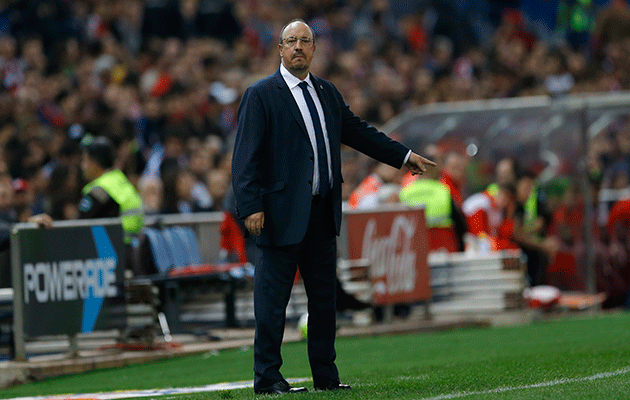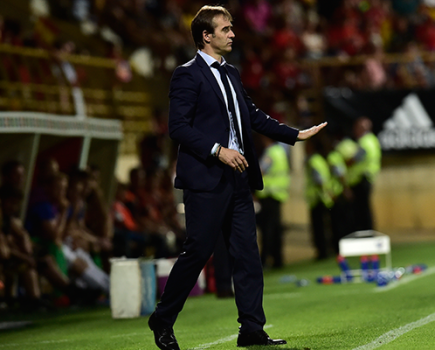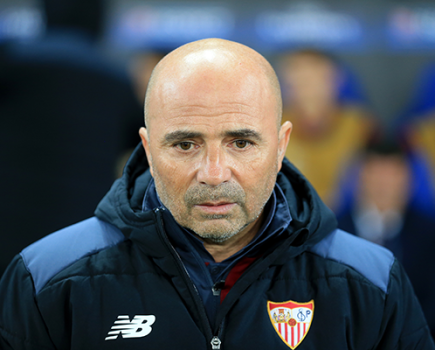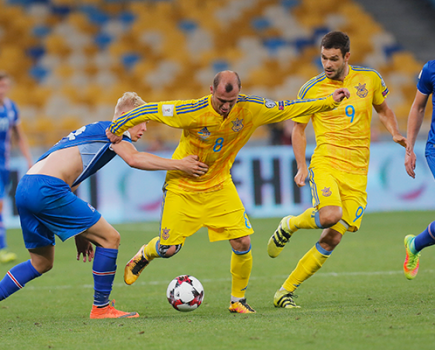* With a little under twenty minutes to go in the Madrid derby, there had been just two attempts on target: Karim Benzema’s eighth minute goal and Antoine Griezmann’s penalty, saved by Keylor Navas. The game was drifting towards the end; even the atmosphere had gone a little flat. But 1-0 is always precarious, and so it proved when Luciano Vietto scored an equaliser in the 83rd minute. Jackson Martínez almost got the winner too, seven minutes later. “This feels like two points dropped,” Rafa Benítez said afterwards and critics were clear whose fault that was: his.
Madrid had sat back and looked for the chance to counter-attack, although the truth was that they didn’t even do that very well, and they had been caught. Benzema and Isco had made way for more defensive players but it did not help. Many considered the draw a deserved outcome. Worse still, others thought it inevitable, confirmation of their prejudices, their rejection of Rafa.
On the day when Madrid were dull, an editorial noted: “Madrid looked like a Benítez team.” The headline in El Mundo ran: “Atlético punish fear,” Writing in AS, Tomás Roncero called Benítez “amarrategui” — boring, basically. And over in Marca, Roberto Palomar called the game “a monument to a lack of creativity and mean-spiritedness.”
In truth, there were plenty of those who had been waiting for Benítez, long since having decided he was too defensive for Madrid, despite the goalscoring records he had racked up in Italy and which he reminded them about. Now they had their chance and they launched quite the offensive. [insert your own ‘unlike him’ punchline here]. It was over the top, exaggerated and often bitter. It also found unexpected and concerning public echo from Sergio Ramos who, told that Benítez had been disappointed with his mistake in giving away the penalty, replied: “there will be talk about my mistake … as there will be about [his] substitutions.”
* “This is a good day to face Barcelona,” Unai Emery said. Most people could not imagine a worse day to do so, but it turned out that he was right. Five weeks into the season, Sevilla were bottom and although they did collect a first victory with a last-minute 3-2 victory over Rayo, they were then beaten by Juventus in the Champions League, turning in a performance that was so insipid that you wondered what had happened to them: Sevilla were just not Sevilla any more.
Against Barcelona, they returned, winning 2-1. It was not always sparkling and they certainly rode their luck. Three times Barcelona hit the post. Five times in total, if you count the three times in one play: Neymar’s free kick hit the post, hit the goalkeeper’s back, hit the post again and rolled all the way along the line, where Piqué didn’t reach it and Coke did, his clearance finding Suárez who hit the outside of the post from a tight angle. Yet, there was something of the old Sevilla here: in personality as well as play.
“The qualities that we are identified by returned,” Emery admitted after he had coached a side to victory over Barcelona for the first time, twenty-one games later. “We played with intensity and aggressiveness, two facets that have not always been there and that I think are necessary: we had to find the synergy and today we found it,” Sevilla’s manager said. The front of local sports paper Estadio Deportivo declared: “With a pair [of balls].”
In a week where there had been rumours about dressing room bust-ups, there was unity too. Players took it in turns to post a photo of the squad celebrating in the dressing room together, beneath a message that said: “Feeling! (Team) Union!”, while offering comments of their own insisting just how together they are. Protesting too much? Perhaps. But victory will help. Sometimes it is not so much that good relationships bring good results as that good results bring a good relationship.
* For Barcelona, there was some comfort in the way they had played, and in the fact that Real Madrid and Atlético drew the following night, but defeat was worrying too. They have now been beaten on their last two away trips and have their worst goal difference at this stage of the season since 2008, a season that turned out to be a disaster, the definitive collapse of the Rijkaard era. The squad is thin, injuries many, and the calendar tough. Is? Has been, perhaps. Although they still have to go to Mestalla and the Bernabéu, they have been to Athletic, Atlético, Celta and Sevilla. And Messi will be back soon. Perhaps the worst is over?
* Villarreal reached the top of the table for the first time in their ninety-two-year history and they will be staying there too, for a while at least. Despite losing their first ever game as leader, surprisingly going down 1-0 at Levante, the Yellow Submarine remained top thanks to a round of games in which none of the top six managed to win. First Celta, then Barcelona, then Villarreal and then Real Madrid missed the chance to go top, all of which meant that, as it turned out, Villarreal didn’t miss the chance at all. Now they have almost a fortnight to take some scissors to the newspapers, a cut out and keep souvenir, as La Liga halts for the international break.
* So much for an uncompetitive league, then. The highest placed team to win were Eibar, down in seventh. It’s not as if that was because all the big teams played each other: five different games made up that pattern, with only Atletico and Real facing each other in the Madrid derby. And the top seven doesn’t even include Sevilla and Valencia, two Champions League teams. Not yet, anyway (and maybe not at all). Oh, and fifteenth, sixteenth seventeenth and eighteenth all won. “People will be surprised around the world but it is more fun this way,” Simeone said.








